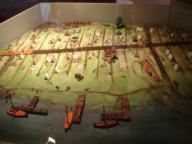 Early Danish Trading Post
|
ECON 701 West Virginia University Fall 2024 Reynolds Hall 4131 4:00- 5:40 T-TH |
|
|
|
||
| Instructor: | Professor Roger D. Congleton | . |
| Office: | 4131
Reynolds Hall E-Mail roger.congleto@mail.wvu.edu (the best way to contact Prof Congleton) |
. |
| Office Hours: | 2:30 - 3:30 Wednesdays and Thursdays, and other afternoons by appointment |
|
|
|
||
| OptionalTexts:. | Nicholson,
W. Microeconomic Theory, Twelfth Edition.
(2016) |
|
| Knight, F. H. Risk Uncertainty and Profit. (1985/1921) Midway Reprint edition, University of Chicago Press. | . | |
| Mas-Colell, A., Green, J. R., and Whinston, M. D. (1995) Microeconomic Theory. Oxford: Oxford University Press | ||
| . | Congleton, R. D.
(2022) Solving Social Dilemmas: Ethics, Politics,
and Prosperity. Oxford University
Press |
|
| .Course Focus: | Advanced
Microeconomics I is divided into three parts. The first
part of the course focuses on the core models and results
of economics. It reviews the theory of consumer behavior
(demand), theory of firm output decisions (supply). the
theory of firm production decisions and their connection
to a firm's cost functions, and models of equilibrium
prices. |
. |
|
|
The second part
explores extensions of the neoclassical model to choice
settings where time and uncertainty are important
features. It models inter-temporal choices and choices in
settings where outcomes or circumstances are probabilistic
rather than certain. It also develops models of innovation
and entrepreneurship. Innovation is an example of
decisionmaking under uncertainty and a source of
uncertainty. The third part explores implications of what might be a the framing institutions of markets. Many of these may be regarded as "market imperfections," but they are simply violations of some of the implicit assumptions about the setting in which trade takes place. Implications of theft, fraud, regulation, politics, and ethical dispositions are developed analytically. All these neglected factors can have significant effects on the manner in which markets operate and the extent of the networks of exchange, production, and innovation that typify contemporary markets. Part three concludes with an overview of welfare economics and its applications to markets, externalities, and system design. The goal of the course is to provide graduate student with a thorough understanding of the core neoclassical models, their most relevant extensions, and implicit foundational assumptions. It also attempts to give them an appreciation of their explanatory power by analyzing linkages between economic, political and social systems..The course is lecture and web-text based. This website provides links to most materials used in the course. |
Undergradute Math Econ Course |
| . | Tentative Course Outline (pdf) |
. |
| Dates | Topic |
|
| . | I. Market Equilibria and Comparative
Statics |
. |
| 22-Aug-24 | 1. Introduction to Course and Economic Models |
MWG: 1, 2 Kn 3 |
| . | Methodological
Individualism: What does rational choice mean to
economists? .Rational Choice as a modeling device.
Scarcity and optimization. Usefulness of models. |
First Lecture |
| 22-Aug-24 | 2.Consumer Demand |
MWG: 5 |
| . | The
Geometry and Mathematics of Decisions to Purchase Goods
and Services, Cobb-Douglas Models, More General Models of
Consumer Choice
[HW 1] |
Derivation
of Demand from Abstract Utility Functions |
| 3-Sept-24 | 3. Supply |
MWG: 3, 5 Kn: 6 |
| . | The
Mathematics of Decisions to Produce Goods for Sale in the
Short Run and Long Run by Price-Taking Firms, Some
Implications of Diminishing Returns. Output decisions of
Price- Making Firms.
.
[HW 2] |
|
| 10-Sept-24 | 4. Production |
MWG: 3, 5 Kn: 4 |
| . | Decisions
about how goods are produced, and what they cost.. Input
Prices, technology, and production costs for price-taking
firms. The demand for Inputs. Wages as a price..
[HW 3] |
|
| 17-Sept-24 | 5. Equilibrium Prices |
|
| . | Market
clearing prices in the short run. Marshallian and
Ricardian Theories of Long Run Supply, Geometry and
Calculus-Based Models of Market Prices,
. [HW 4] |
. |
| 24-Sept-24 |
Review for Midterm
Exam (Prerecorded
overview of Part I) |
|
| 26 - Sept-24 | MIDTERM
EXAMINATION |
|
| 1-Oct-24 | Midterm Exams Returned and Reviewed |
|
| II. Risk, Uncertainty, and Markets |
||
| 3-Oct-24 |
6.
Intertemporal
Choice |
|
| Making plans that take
more than 1 "period" to execute. Time preferences and
discounting. Present and future values as common
denominators for choices with future effects. |
||
| 10-Oct-24 | 7. Economic Implications of
Risk |
N: 9, 10, 19
MWG: 13, 14
|
| Risk aversion and choice under uncertainly. Maximizing expected utility. The demand for Insurance and other risk pooling and shifting strategies. Choices with uncertain outcomes. Illustrations: purchasing goods with random quality, quality control in production, output decisions with random prices. [HW 5] | ||
| 22-Oct-24 | 8. Uncertainty and
Entrepreneurship |
N:9, 10;
MWG: 14 Kn: 9, 10
|
| Uninsurable Risks and the Usefulness of Reserves. Entrepreurship as decisionmaking under uncertainty. Knight, Schumpeter, and Kirzner on Entrepreneurship. Entrepreneurs as Formeteurs, Investing in Innovation, Innovation as a source of economic profits, Innovation as a source of uncertainty. [ HW 6] | ||
| Early Draft chapters and future
chapters not covered this semester: (9) The "Simple" Economics of Information (10) "Goods" as Collections of Valued Attributes--Hedonics (11) Optimization by Multi-product Firms (12) Government Policies and the Extent of Markets (13) Game Theory: Modelling Strategic Interactions |
Stigler (1961) Farrell and Rabin (1996) Lancaster (1966) Becker (1965) Brown et al (1979) Riley (1975) Baysinger and Butler (1985) |
|
| III. Social, Legal, and Political Underpinnings of Markets | ||
|
29-Oct-24
|
14. Law and Economics |
MWG: 11, 12 |
| The Economics of Crime
the Extent of Markets, Fraud and the extent of Markets,
the Quality of Law Enforcement, Realizable Gains to Trade,
and the Extent of Markets
|
||
| 5-Nov-24 | 15. Politics and
Economics--Political Economy |
MWG: 21, 22 |
| . | Electoral Competition and Electoral Determined Public Policy, Market Adjustments to Public Policies, Investments in Rent Seeking and the Extent of Markets. [HW 7] | . |
| 12-Nov-24 | 16. Ethics, Norms, and the
Efficiency of Markets |
Kn: 5, 11 / C: 6,8 |
|
|
Culture
and the Efficiency of Markets. Economizing on Etihcal
Agents. Culture and the Extent and Growth Rates of
Markets. Extended Rational Choice Models. |
. |
| 17.
Firms as Organizations (not covered this
semester) |
||
| Decision making within
larger firms as Collective Choices. Decentralized
authority and agency proglems. Relationships with
Government, Rent-Seeking as Profit Seeking, Do Firms
Maximize Profits? Multidimensional goals of some firms. |
E |
|
| 19-Nov-24 | 18. Welfare Economics | |
| Deciding what is best, Utillitarian Notions of Economic Efficiency, Cost Benefit Analysis, the Pareto Criteria, Contractarianism. The normative properties of exchange (w and w/o externalities). [HW 8] |
N: 9
MWG: 10, 15, 16
|
|
| 23 Nov
- 1-Dec-24 |
FALL/Thanksgiving
BREAK |
Ideas for Papers |
| 3-Dec-24 | 19.
Overview of the Course / Paper Work Shop |
|
| 5-Dec-24 | Review for End Term Exam |
|
| 10-Dec-24 |
END-TERM Exam |
|
| 12-Dec-24 |
Exams
returned and Reviewed |
|
| 12-Dec-24 |
Informal Paper Workshop |
|
| Available for Zoom Meetings Re your
papers during exam week |
||
| 18-Dec-24 | 8-10 page paper due at 11:59 pm on an applied micro topic | |
| . | Grades: Midterm Exam | 35.00% |
| . | 8-10 page Paper | 25.00% |
| . | Endterm Exam | 35.00% |
| Homework |
5.00% |
|
| . | Marginal extra credit for class participation (up to 5% bonus) |
